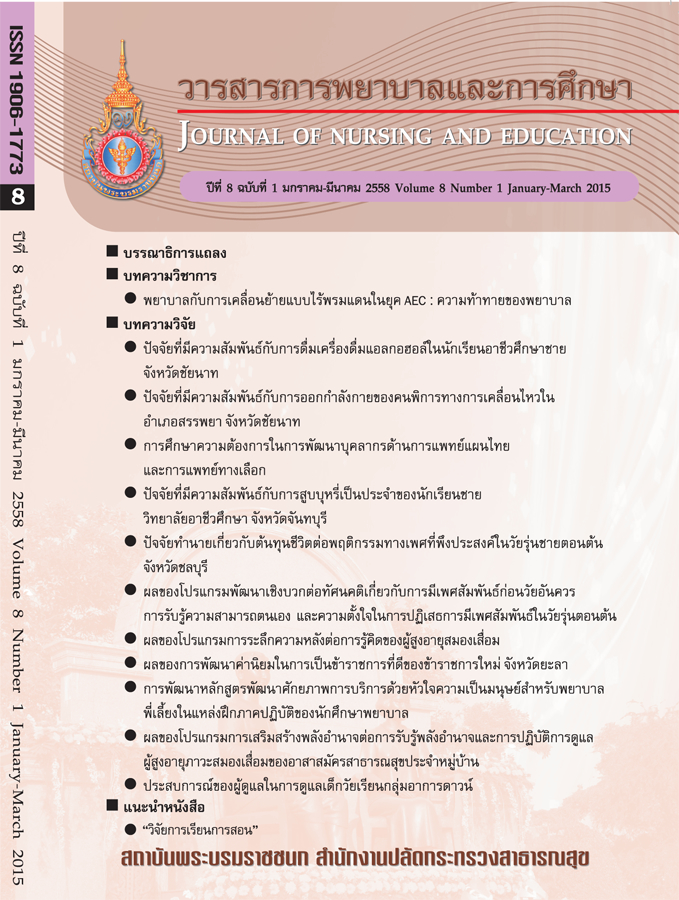ผลของโปรแกรมพัฒนาเชิงบวกต่อทัศนคติเกี่ยวกับการมีเพศสัมพันธ์ก่อนวัยอันควรการรับรู้ความสามารถตนเอง และความตั้งใจ ในการปฏิเสธการมีเพศสัมพันธ์ ในวัยรุ่นตอนต้น
คำสำคัญ:
Positive Youth Development, Early adolescents, Premarital sexบทคัดย่อ
บทคัดย่อการศึกษาครั้งนี้เป็นการวิจัยกึ่งทดลองแบบสองกลุ่มวัดก่อนและหลังการทดลอง มีวัตถุประสงค์
เพื่อศึกษาผลของโปรแกรมพัฒนาเชิงบวกต่อทัศนคติต่อการมีเพศสัมพันธ์ก่อนวัยอันควร การรับรู้ความสามารถตนเอง และความตั้งใจในการปฏิเสธการมีเพศสัมพันธ์ของวัยรุ่นตอนต้น กลุ่มตัวอย่างเป็นนักเรียนชายและหญิงที่กำลังศึกษาอยู่ในชั้นมัธยมศึกษาปีที่ 1โรงเรียนขยายโอกาส อำเภอบางละมุง จังหวัดชลบุรี จำนวน 2 แห่ง แบ่งเป็นกลุ่มทดลอง 1 แห่ง และกลุ่มควบคุม 1 แห่ง กลุ่มละ 33 คน โดยกลุ่มทดลองได้รับโปรแกรมพัฒนาเยาวชนเชิงบวก ที่ประกอบด้วยกิจกรรม 5 ชุดๆ ละ 60 นาที นาน 5 สัปดาห์ ซึ่งประกอบด้วย การเรียนรู้ร่วมกันในกลุ่มย่อย และการให้ความรู้โดยเพื่อน เช่น การสาธิต การเล่าเรื่อง การฝึกทักษะ เน้นการสร้างบรรยากาศเชิงบวกที่ส่งเสริมการเรียนรู้ตลอดการทำกิจกรรม ในขณะที่กลุ่มควบคุมได้รับ
การเรียนการสอนตามปกติ เก็บรวบรวมข้อมูลโดยใช้แบบสอบถาม วิเคราะห์ข้อมูลโดยใช้สถิติ ร้อยละ
ค่าเฉลี่ยส่วนเบี่ยงเบนมาตรฐาน Dependent t-test และ Independent t-test ผลการ ศึกษาพบว่าภายหลัง
การทดลองกลุ่มที่ได้รับโปรแกรมอิทธิพลทางสังคมมีทัศนคติต่อการหลีกเลี่ยงการมีเพศสัมพันธ์ก่อนวัยอันควร (p < .05) การรับรู้ความสามารถตนเอง (p < .001) และความตั้งใจในการปฏิเสธการมีเพศสัมพันธ์
(p <.05) มากกว่ากลุ่มควบคุมอย่างมีนัยสำคัญทางสถิติที่ระดับ .05 ผลการศึกษา มีข้อเสนอแนะว่า กิจกรรมการสร้างบรรยากาศเชิงบวกผ่านการแลกเปลี่ยนเรียนรู้ร่วมกัน และการให้ความรู้โดยเพื่อน สามารถปรับเปลี่ยนทัศนคติต่อการมีเพศสัมพันธ์ก่อนวัยอันควร การรับรู้ความสามารถตนเอง และความตั้งใจต่อการปฏิเสธ
การมีเพศสัมพันธ์ได้
คำสำคัญ : พัฒนาเยาวชนเชิงบวก วัยรุ่นตอนต้น การมีเพศสัมพันธ์ก่อนวัยอันควร
Abstract
This quasi - experimental study with nonequivalent control group pretest, posttest design aimed to examine the effects of social influence program on attitudes towards premarital sex, sexual refusal self-efficacy, and intention refuse premarital-sex among early adolescents. The participants were male and female students studying in Grade 7 at Opportunity Expansion Schools located in Bang Lamung, Chon Buri. They were randomly assigned to experimental group (n = 33) and control groups (n = 33). The intervention group received Positive Development Program consisted of five Modules of activities, each modules spend 60 minutes for 5 weeks. The module included interactive learning in small group and peer-led education such as role–plays, storytelling, and skills building. The control group received health education from normal curriculum. The data were collected by self-report
questionnaires, analysed by percentage, mean, standard deviation, dependent t-test and independent
t-test. The findings indicated that students with Social Influence Intervention course had statistically significant related to more attitudes towards avoiding premarital sex (p < .05), more sexual refusal
self-efficacy (p < .001), and more intention to sexual refusal (p < .05) than students in the control group. This result suggested activities with positive atmosphere through interactive learning and
peer-led education could enhance premarital sex attitudes, refusal sex self-efficacy, and intention to sexual refusal among early adolescents.
Keywords : Positive Youth Development; Early adolescents; Premarital sex






